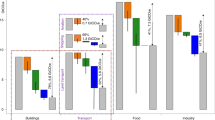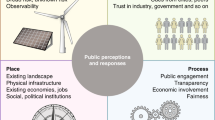Abstract
Understanding which energy future configurations provide publicly acceptable levels of energy security, affordability, and environmental protection is critical for institutional decision-making. However, little is known about how scenarios influence energy preferences. Here we present nationally representative UK data on public preferences for energy futures using the my2050 scenario-building tool that encourages engagement with the holistic complexities of system change. Engagement with the tool strengthened existing preferences for renewable energy and intentions to take personal action. Importantly, patterns of energy preferences were influenced by exemplar scenarios, which served as reference points that anchored choices. Carbon capture and storage, nuclear power, biofuels, and changes to heating and travel were particularly impacted by scenarios indicating uncertainty and ambivalence regarding these options. Scenarios (and scenario-building tools) are valuable for engaging citizens about future energy systems. However, care is required in their design and interpretation to reach robust conclusions about underlying preferences and acceptance.
This is a preview of subscription content, access via your institution
Access options
Access Nature and 54 other Nature Portfolio journals
Get Nature+, our best-value online-access subscription
$29.99 / 30 days
cancel any time
Subscribe to this journal
Receive 12 digital issues and online access to articles
$119.00 per year
only $9.92 per issue
Buy this article
- Purchase on Springer Link
- Instant access to full article PDF
Prices may be subject to local taxes which are calculated during checkout



Similar content being viewed by others
References
IEA Annual Report: World Energy Outlook (International Energy Agency, 2016); https://www.iea.org/newsroom/news/2016/november/world-energy-outlook-2016.html
The Carbon Plan (UK Department of Energy and Climate Change, 2011); https://www.gov.uk/government/publications/the-carbon-plan-reducing-greenhouse-gas-emissions--2
Watson, J., Gross, R. & Ketsopoulou, I. Energy policy special issue: UK Energy Research Centre uncertainties project. Energy Policy 87, 604–606 (2015).
2050 Pathway Analysis (UK Department of Energy and Climate Change, 2010); https://www.gov.uk/guidance/2050-pathways-analysis
Foxon, T. J., Hammond, G. P. & Pearson, P. J. Developing transition pathways for a low carbon electricity system in the UK. Technol. Forecast. Soc. 77, 1203–1213 (2010).
Scheer, D., Konrad, W. & Scheel, O. Public evaluation of electricity technologies and future low-carbon portfolios in Germany and the USA. Energy Sustain. Soc. 3, 8 (2013).
Ekins, P. et al. The UK Energy System in 2050: Comparing Low Carbon, Resilient Scenarios (UK Energy Research Centre, 2013).
UK Future Energy Scenarios (National Grid, 2014).
Demski, C., Butler, C., Parkhill, K. A., Spence, A. & Pidgeon, N. Public values for energy system change. Glob. Environ. Change 34, 59–69 (2015).
Butler, C., Demski, C., Parkhill, K. A., Pidgeon, N. & Spence, A. Public values for energy futures: framing, indeterminacy and policy making. Energy Policy 87, 665–672 (2015).
Nielson, S. K. & Karlsson, K. Energy scenarios: a review of methods, uses and suggestions for improvement. J. Glob. Energy Issues 27, 302–322 (2007).
Perlaviciute, G. & Steg, L. The influence of values on energy alternatives. Renew. Energy 77, 259–267 (2015).
Trutnevyte, E., McDowall, W., Tomei, J. & Keppo, I. Energy scenario choices: insights from a retrospective review of UK energy futures. Sustain. Renew. Energy Rev. 55, 326–337 (2016).
Pidgeon, N., Demski, C., Butler, C., Parkhill, K. A. & Spence, A. Creating a national citizen engagement process for energy policy. Proc. Natl Acad. Sci. USA 111, 13606–13613 (2014).
Miller, C. A., Iles, A. & Jones, C. F. The social dimensions of energy transitions. Sci. Cult. 22, 135–148 (2013).
Devine-Wright, P. Explaining ‘NIMBY’ objections to a power line: the role of personal, place attachment and project-related factors. Environ. Behav. 45, 761–781 (2013).
Henwood, K. et al. Energy Biographies Research Report (Cardiff Univ., 2015); http://orca.cf.ac.uk/87333/
Sovacool, B. K. What are we doing here? Analyzing fifteen years of energy scholarship and proposing a social science research agenda. Energy Res. Soc. Sci. 1, 1–29 (2014).
Goulden, M., Bedwell, B., Rennick-Egglestone, S., Rodden, T. & Spence, A. Smart grids, smart users? The role of the user in demand side management. Energy Res. Soc. Sci. 2, 21–29 (2014).
Mayer, L. A., Bruine de Bruin, W. & Granger Morgan, M. Informed public choices for low-carbon electricity portfolios using a computer decision tool. Environ. Sci. Technol. 48, 3640–3648 (2014).
de Best-Waldhober, M. et al. Informed public opinions on CCS in comparison to other mitigation options. Energy Proc. 1, 4795–4802 (2009).
Bessette, D. L., Arvai, J. & Campbell-Arvai, V. Decision support framework for developing regional energy strategies. Environ. Sci. Technol. 48, 1401–1408 (2014).
Bessette, D. L., Campbell-Arvai, V. & Arvai, J. Expanding the reach of participatory risk management: testing an online decision-aiding framework for informing internally consistent choices. Risk Anal. 36, 992–1005 (2016).
Jones, C. R., Eiser, J. R. & Gamble, T. R. Assessing the impact of framing on the comparative favourability of nuclear power as an electricity generating option in the UK. Energy Policy 41, 451–465 (2012).
Bailey, R. An Exploration of the Low Carbon Futures for the Bristol Region PhD Thesis, Univ. West of England (2012).
Stagl, S. Multicriteria evaluation and public participation: the case of UK energy policy. Land Use Policy 23, 53–62 (2006).
Energy Scenarios to 2050 (Shell Global, 2008); www.shell.com/content/dam/shell/static/public/downloads/brochures/corporate-pkg/scenarios/shell-energy-scenarios2050.pdf
The Energy Report: 100% Renewable Energy by 2050 (World Wildlife Fund, 2011); http://www.worldwildlife.org/publications/the-energy-report
Allen, P. & Chatterton, T. Carbon reduction scenarios to 2050: an explorative analysis of public preferences. Energy Policy 63, 796–808 (2013).
My2050 (Department of Energy and Climate Change, 2012); http://my2050.decc.gov.uk
Corner, A. J. et al. Nuclear power, climate change and energy security: exploring British public attitudes. Energy Policy 39, 4823–4833 (2011).
Shaw, C. J. Reframing climate risk to build public support for radical emission reductions: the role of deliberative democracy. Carbon Manage. 5, 349–360 (2015).
Levin, I. P., Schneider, S. L. & Gaeth, G. J. All frames are not created equal: a typology and critical analysis of framing effects. Organ. Behav. Hum. Dec. 76, 149–188 (1998).
Tversky, A. & Kahneman, D. Judgement under uncertainty: heuristics and biases. Science 185, 1124–1130 (1974).
Chapman, G. B. & Johnson, E. J. in Heuristics and Biases: The Psychology of Intuitive Judgment (eds Gilovich, T., Griffin, D. & Kahneman, D. ) 120–138 (Cambridge Univ. Press, 2002).
Lichtenstein, S. & Slovic, P. The Construction of Preference (Cambridge Univ. Press, 2006).
Macnaghten, P. Researching technoscientific concerns in the making: narrative structures, public responses and emerging nanotechnologies. Environ. Plan. A 42, 23–37 (2010).
Miller, C. The dynamics of framing environmental values and policy: four models of societal processes. Environ. Values 9, 211–233 (2000).
Whitmarsh, L. E. et al. Public Attitudes, Understanding, and Engagement in Relation to Low-carbon Energy. A Selective Review of Academic and Non-academic Literatures (Research Councils UK Energy Programme, 2011).
Demski, C., Spence, A. & Pidgeon, N. Summary Findings of a Survey Conducted in August 2012—Transforming the UK Energy System: Public Values, Attitudes and Acceptability (UK Energy Research Centre, 2013); http://www.ukerc.ac.uk/publications/transforming-the-uk-energy-system-public-values-attitudes-and-acceptability-summary-findings-from-a-survey-conducted-august-2012.html
Butler, C., Parkhill, K. & Pidgeon, N. Deliberating Energy Transitions in the UK—Transforming the UK Energy System: Public Values, Attitudes and Acceptability (UK Energy Research Centre, 2013); http://www.ukerc.ac.uk/publications/transforming-the-uk-energy-system-public-values-attitudes-and-acceptability-deliberating-energy-system-transitions-in-the-uk.html
Graham-Rowe, E. et al. Mainstream consumers driving plug-in battery-electric and plug-in hybrid electric cars: a qualitative analysis of responses and evaluation. Transport. Res. A 46, 140–153 (2012).
2050 Calculator (Department of Energy and Climate Change, 2016); http://2050-calculator-tool.decc.gov.uk/#/home
Tomei, J. et al. An Early Evaluation of the 2050 Calculator International Outreach Programme (Institute of Sustainable Resources, University College London, 2015).
Dillman, D. A. Mail and Internet Surveys: The Tailored Design Method (John Wiley, 2007).
Acknowledgements
This research formed part of the programme of the UK Energy Research Centre and was supported by the UK Research Councils (NE/I006753/1 and EP/L024756/1). Additional support was received from the Welsh Government, the Leverhulme Trust (F/00 407/AG), and for A. Spence from Horizon Digital Economy Research EPSRC grant (EP/M02315X/1). The research team would also like to thank the project advisory panel.
Author information
Authors and Affiliations
Contributions
C.D. led the design of the research, conducted data collection, performed the analysis and drafted the manuscript. A.S. and N.P. significantly contributed to the design of the study, discussion of the data analysis and writing of the manuscript.
Corresponding author
Ethics declarations
Competing interests
The authors declare no competing financial interests.
Supplementary information
Supplementary Information
Supplementary Notes 1–3, Supplementary Figure 1, Supplementary Tables 1–6, Supplementary References (PDF 477 kb)
Rights and permissions
About this article
Cite this article
Demski, C., Spence, A. & Pidgeon, N. Effects of exemplar scenarios on public preferences for energy futures using the my2050 scenario-building tool. Nat Energy 2, 17027 (2017). https://doi.org/10.1038/nenergy.2017.27
Received:
Accepted:
Published:
DOI: https://doi.org/10.1038/nenergy.2017.27
This article is cited by
-
A systemic approach to mapping participation with low-carbon energy transitions
Nature Energy (2021)
-
Public engagement: Building energy futures
Nature Energy (2017)
-
Understanding future emissions from low-carbon power systems by integration of life-cycle assessment and integrated energy modelling
Nature Energy (2017)



